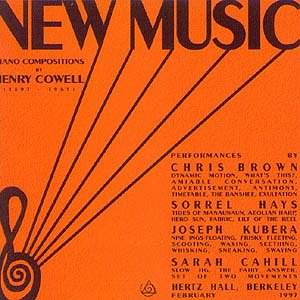COWELL
piano music
 Chris Brown/Sorrel Hays/Joseph
Kubera/Sarah Cahill - pianos
Chris Brown/Sorrel Hays/Joseph
Kubera/Sarah Cahill - pianos
 New Albion NA 103 CD
[70.58]
New Albion NA 103 CD
[70.58]
Crotchet
Amazon
UK Amazon USA

Henry Cowell (1897-1965) pioneered most of the extended piano techniques
now commonplace, and he wrote many pieces with his trade-mark 'tone clusters'
(he invented the term) before he was 15. He founded New Music Quarterly and
wrote an important book, New Musical Resources.
Dubbed in London 'the Loudest Pianist in the World' by The Times in
1920, his body of piano music is so large, and has become so influential,
as to warrant in his honour a whole three-day festival in 1997 at Berkely,
California, from which derives these recordings by four of the pianists who
took part. Besides works like The Banshee and Aeolian Harp,
which take us inside the piano lid, there are many other curiosities in this
selection covering his output from 1912-1929, some of the pieces still
unpublished. Cowell brings to mind another maverick original, Percy Grainger,
which may give a lead as to what to expect.
Each pianist describes what Cowell has meant to him/her. Chris Brown
celebrates his Northern Caalifornian artistic independence, & found
in Cowell's music links with the Pacific land and seascape, its naivety and
uninhibited directness combined with a force of nature, demanding phsyical
commitment and new skills from the interpreter to play simple diatonic or
chromatic melodies with one hand, the other using forearms and elbows.
Sorrel Hays found his use of the harmonic resonances of the grand
piano restored her shaken confidence in the future of her own instrument.
As a composer, she strives to continue where Henry Cowell left off. Joseph
Kudera chose his atmospheric miniatures Nine Ings, and values
Cowell's polystylism. Sarah Cahill came across Cowell in her father's
collection of 78s and has found their physicality satisfying, 'arms, fists,
elbows in contact - - - allow you to become director of a huge chorus of
jostling keys' . There is a strong Irish traditional streak, as in Fairy
answer, which alternates keys and strings, the latter representing how
fairies 'change the music about just a little', and Set of Two
Movements, based upon deep purple shadows of Irish valleys and dazzling
golden yellow sun-lit tops of the hills'.
This is an excellent recital, recorded live before appreciative audiences,
and is a recommendable introduction to Cowell's piano music, which is still
heard only sporadically in UK. Henry Cowell himself can be heard playing
on Smithsonian/Folkways SF40801 and Sorrel Doris Hays has a whole CD of Cowell
on Townhall THCD-48.
Peter Grahame Woolf

